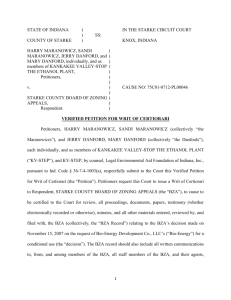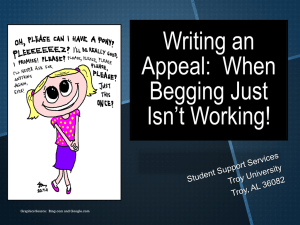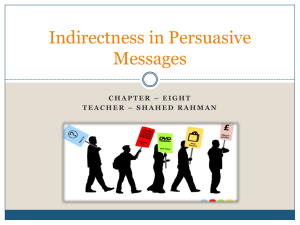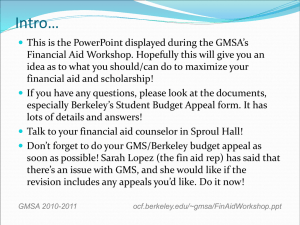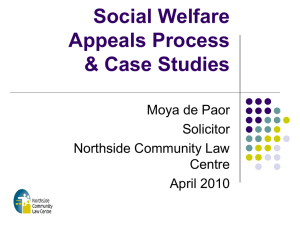BZA Appeals and Litigation Resulting from Such Appeals
advertisement
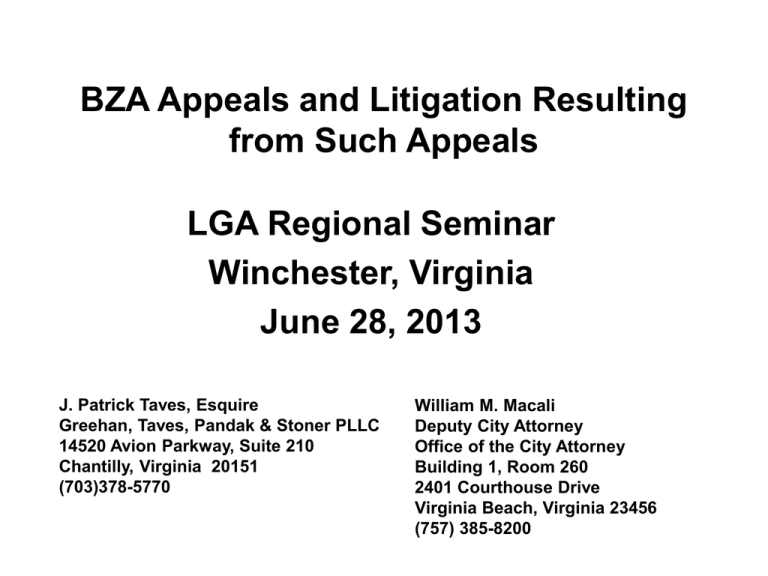
BZA Appeals and Litigation Resulting from Such Appeals LGA Regional Seminar Winchester, Virginia June 28, 2013 J. Patrick Taves, Esquire Greehan, Taves, Pandak & Stoner PLLC 14520 Avion Parkway, Suite 210 Chantilly, Virginia 20151 (703)378-5770 William M. Macali Deputy City Attorney Office of the City Attorney Building 1, Room 260 2401 Courthouse Drive Virginia Beach, Virginia 23456 (757) 385-8200 The authors wish to acknowledge Daniel J. Wisniewski, Associate, Greehan, Taves, Pandak & Stoner, PLLC, for his assistance in preparing this outline. Appeals of Administrative Zoning Decisions to the BZA Statutory Authorization for BZAs • A BZA is a “creature of statute.” Adams Outdoor Adv., Inc. v. Bd. of Zoning Appeals, 261 Va. 207, 544 S.E.2d 315 (2001). • Va. Code §§ 15.2-2308 to -2314. • These statutes come from the Standard State Zoning Enabling Act (circa 1927). What Can Be Appealed • Any order, requirement, decision or determination made by an “administrative officer.” § 15.2-2309(1). • Note: PODs and site plans are different! They operate under the statutes applicable to subdivision plat review “mutatis mutandis.” See § 15.2-2258. Challenges to POD and site plan disapprovals are therefore brought directly to the circuit court. §§ 15.2-2259(D) (PODs and site plans), -2260(E) (site plans only), and -2261(B)(2) (site plans only). • PODs and site plans gain vested rights status upon being approved, whereas other decisions, orders, etc., must be no longer subject to appeal or no longer subject to change, modification, or reversal pursuant to 15.2-2311(c), before vesting. • Decisions of the zoning administrator after notice and hearing. § 15.2-2309(3). Why Appeal to the BZA? • If you do not appeal, the matter becomes a “thing decided and not subject to attack.” Gwinn v. Alward, 235 Va. 616, 621, 369 S.E.2d 410, 412 (1988). • You must first “exhaust adequate and available administrative remedies.” Gayton Triangle Land Co. v. Bd. of Supervisors, 216 Va. 764, 766–67, 222 S.E.2d 570, 572 (1976). • But where there is “no administrative remedy equal to the relief sought” then appeal to the BZA is not required. Town of Jonesville v. Powell Valley Vill. Ltd. P’ship, 254 Va. 70, 74, 487 S.E.2d 207, 210 (1997) (BZA does not have authority to declare zoning ordinances invalid). Who Can Appeal to the BZA? • Any “person aggrieved” can appeal. § 15.2-2311(A). • Appellant “must show that he has an immediate, pecuniary and substantial interest in the [matter], and not a remote or indirect interest.” Va. Beach Beautification Comm’n v. Bd. of Zoning Appeals, 231 Va. 415, 419, 344 S.E.2d 899, 902 (1986). • The statute contemplates a “substantial grievance and means a denial of some personal or property right, legal or equitable, or the imposition of a burden or obligation . . . different from that suffered by the public generally.” Id. (emphasis added); accord Virginia Marine Res. Comm’n v. Clark, 281 Va. 679, 687, 709 S.E.2d 150, 155 (2011). Who Can Appeal to the BZA? • “Person Aggrieved”: A Two-Step Test. See Friends of the Rappahannock v. Bd. of Zoning Appeals, 2013 WL 2443349, Record No. 120874 (June 6, 2013). 1. Ownership or Occupancy of Nearby Land 2. Particularized Harm Different from the General Public • Note: Local governing bodies have standing because they have an “immediate and substantial interest” in the ordinance. Bd. of Supervisors v. Bd. of Zoning Appeals (Hickerson), 268 Va. 441, 604 S.E.2d 7 (2004). Who Can Appeal to the BZA? • The statute also allows any officer, department, board, or bureau of the locality affected by an administrative decision to appeal. § 15.2-2311(A). • A Zoning Administrator is not required to appeal their own incorrect decision to the BZA in order to change it. Gwinn v. Collier, 247 Va. 479, 482, 443 S.E.2d 161, 163 (1994). Pleading Aggrievement • Grounds for aggrievement must be affirmatively plead. • “Conclusory” allegations are not enough. • Must present a “factual background” sufficient to show that the particular decision being appealed would cause the loss of some personal or property right different from the public in general. Friends, 2013 WL 2443349. Pleading Aggrievement in Friends • In Friends, the Court held that the following “general objections” to a permit allowing a sand and gravel mining operation were insufficient (i.e., plaintiffs were not “aggrieved”): • Land disturbance, noise, and industrial activity will frighten away the wildlife. • The operation will end scenic beauty of the location. • Activities will increase noise, dust, and traffic from barges and commercial boats. • Use will harm their recreational use of the river for wading and observing wildlife. • Concern about the long term health and well being of children nearby, one of whom had asthma. Case Law Principles Also Apply to Appeals to BZAs • Cases discuss appeals to the circuit court from the BZA. • Logically, these principles also apply to appeals to the BZA. • There is no statutory provision for waiver of the “person aggrieved” standing requirement. When Must the Appeal be Taken? • Within thirty days of the issuance of: 1. A written notice of a zoning violation (NOV) or a written order of the Zoning Administrator. or 2. Any other decision of the Zoning Administrator or other administrative officer that is not an NOV or a written order. What’s the difference? When Must the Appeal be Taken? • For a written notice of a NOV or a written order of the Zoning Administrator, the following statements must be included with the notice/order: 1. Recipient may have a right to appeal within 30 days. 2. The Decision shall be final and unappealable if not appealed within 30 days. 3. The applicable appeal fee. 4. Where additional information may be obtained regarding an appeal. § 15.2-2311(A). When Must the Appeal be Taken? •For NOVs localities have more leeway in prescribing shorter appeal periods for certain violations: Notwithstanding the provisions of § 15.2-2311, a zoning ordinance may prescribe an appeal period of less than 30 days, but not less than 10 days, for a notice of violation involving temporary or seasonal commercial uses, parking of commercial trucks in residential zoning districts, maximum occupancy limitations of a residential dwelling unit, or similar short-term, recurring violations. § 15.2-2286(A)(4) (emphasis added). When Must the Appeal be Taken? • For any other decision of the Zoning Administrator or other administrative officer there are no required notice statements, and the 30 day clock starts on the date of decision. See § 15.2-2311(A). • • These decisions can be made orally. See Lilly v. Caroline County, 259 Va. 291, 296, 526 S.E.2d 743, 745 (2000). HOWEVER, written decisions are preferred, and it is better practice to include the required statements for NOVs and written orders in anything that could be construed to be an appealable decision. How to Give Written Notice • For NOVs or written orders, registered or certified mail or posting is sufficient. • For other decisions, there is no statutory guidance for the notice method, but registered or certified mail, or service in person, is recommended. § 15.2-2311(A). How Must an Appeal be Taken? • By filing with the zoning administrator and the BZA a “notice of appeal specifying the grounds thereof.” • Must be included: 1. Bases for aggrieved status. 2. Substantive bases for the appeal. See § 15.2-2311(A). The “Stay” Provisions • An appeal stays “all proceedings in furtherance of the action appealed from,” unless the zoning administrator certifies to the BZA that a stay would in his opinion cause imminent peril to life or property. • The stay provisions apply to zoning enforcement actions, not where someone has received a favorable decision from the zoning administrator See § 15.2-2311(B). The 60 Day Deadline Provision • After sixty days, no “change, modification, or reversal” can be made to a written order, requirement, decision, or determination by the administrator if the person aggrieved has already 1) materially changed his position, 2) in good faith reliance. • Exceptions: 1. The decision was obtained through malfeasance or fraud. 2. For the correction of clerical errors, where the attorney for the governing body concurs. See § 15.2-2311(C). When the BZA Hears the Appeal • The BZA has 90 days to render a decision. But see Tran v. Bd. of Zoning Appeals, 260 Va. 654, 536 S.E.2d 913 (2000) (90-day period is directory, not mandatory). • A majority vote is required to overturn an administrative decision. • The BZA Chair can administer oaths and compel attendance of witnesses. • Consistent administrative interpretations of an ordinance by the officials charged with its enforcement are entitled to great weight. Masterson v. Bd. of Zoning Appeals, 233 Va. 37, 353 S.E.2d 727 (1987). See § 15.2-2312. Consistent Administrative Interpretation • Zoning Administrators and BZAs “develop expertise in the relationship between particular textual language and a local government’s overall zoning plan.” Lamar Co., LLC v. Bd. of Zoning Appeals, 270 Va. 540, 620 S.E.2d 753 (2005). • But Zoning Administrators do not get any special deference in their interpretation of textual language when the ordinance language is plain and unambiguous. See Bd. of Zoning Appeals v. 852 L.L.C., 257 Va. 485, 514 S.E.2d 767 (1999). Bd. of Zoning Appeals v. 852 L.L.C. 257 Va. 485, 514 S.E.2d 767 (1999) • Rule: There is no room for interpretation or construction of zoning ordinances when the ordinance language is plain and unambiguous. • Facts: Zoning Administrator awarded an 18.6% density credit for an existing lake on a landowner’s property when the locality’s zoning ordinance only allowed for either a 0%, 50%, or 100% credit (depending on the type of body of water: existing lake, tidal wetland, or stormwater management pond). • Held: The Zoning Administrator did not have the authority to interpret the zoning ordinance to provide for a reduced density credit because the ordinance was clear and unambiguous. Equitable Principles and the BZA • Equitable concerns cannot be a basis for the BZA’s decision in an administrative appeal. Bd. of Supervisors v. Bd. of Zoning Appeals, 271 Va. 336, 351, 626 S.E.2d 374, 383 (2006). • Rationale applicable to the 852 L.L.C. case. The Safety Valve • A narrow safety valve exists for neighbors if they did not appeal a decision: Va. Code § 15.2-2313. • If a building permit is issued, and abatement of construction is sought, then an aggrieved neighbor must satisfy several requirements: 1. Cannot have had actual notice of the building permit, 2. There must be a violation of the zoning ordinance, and 3. Suit must be filed within 15 days of the start of construction. Appeals of BZA Decisions to the Circuit Court Initial Observations: 1. The controlling statute, Va. Code §15.22314, is not a model of clarity. It leaves some open questions concerning procedures in appeals of BZA decisions to the Circuit Court. 2. In light of the above, local practices may vary from locality to locality. Needless to say, when in doubt, check the local practice. Va. Code §15.2-2314. Certiorari to review decision of board. • Initiated by filing Petition for Writ of Certiorari with Clerk of the Circuit Court • Styled "In Re: [date] Decision of the Board of Zoning Appeals of [locality name]" • Must specify the grounds on which petitioner is aggrieved • Must be filed within 30 days after the date of the final decision of the Board (not when the decision is filed) A “final decision” of the BZA is one that resolves the merits of an appeal or application before the BZA or dismisses them with prejudice on a procedural basis. West Lewinsville Heights Citizens Ass’n v. Board of Zoning Appeals, 270 Va. 259 (2005). Failure to timely file an appeal of the BZA’s decision is a bar to the action. Id. However, if a PWC is timely filed but does not name all necessary parties, the action is not barred, as the 30-day time limit is not a statute of limitations. Parker v. Miller, 250 Va. 175 (1995). The 30-day rule is not an aspect of subject matter jurisdiction, and failure to file within 30 days is thus waived if not asserted in the trial court. Board of Supervisors v. Board of Zoning Appeals, 271 Va. 336 (2006). Upon the “presentation” of a Petition for Writ of Certiorari: Court shall allow a Writ of Certiorari to review the decision of the board (Note that “certiorari,” i.e., bringing up the record for review by a higher body, generally refers to a discretionary grant of review – not here, though) Practice note: The Writ should be tendered to the Clerk along with the Petition. Some clerks may just attach a Notice of Motion for Judgment requiring a response if no Writ is filed, but the better practice is to tender a Writ along with the Petition. The court shall prescribe in the Writ the time within which a Return must be made, which shall not be less than 10 days and may be extended by the court. The statute does not say when the time begins (i.e., when the writ is entered or served?). Practice notes: 1. Read the Writ and object to anything improper (e.g., discovery in disguise). 2. If you are not the Petitioner, and time is short, few attorneys will object to an extension of time, but if they do, the court can extend the date. Don’t accept a 10-day return period; that is ridiculous. The statute does not say who the Writ of Certiorari is to be served upon (presumably, upon the necessary parties, which does not include the BZA). Practice note: Since the Writ is essentially an order to file the papers acted upon by the BZA, one would think that the service of the Writ should be on the BZA. The best practice is to serve the BZA as well the necessary parties, and get on with the case. Of course, unless you are challenging the BZA’s decision, you won’t have that option – the Petitioner will. . The return consists of certified or sworn copies of the papers acted upon by the BZA in making its decision or the portions thereof as may be called for by the Writ. Practice note: Just file all of the papers, even those not specified in the Writ, and be done with it. The Return shall “concisely set forth such other facts as may be pertinent and material to show the grounds of the decision appealed from” and shall be verified. A statement that the BZA relied on its view of the property can, and in many cases, should, be included in the Return. The statute is also silent on responsive pleadings to be filed by the Respondents (which, depending on who brought the appeal to the BZA and who won the case, could be the governing body, the landowner and/or another aggrieved person). Practice note: one approach is simply for them to file an Answer or other responsive pleading (e.g., plea in bar). Or, if they are not named in the Petition, they can intervene (discussed later). In Virginia Beach, at least, the accepted practice is to file the BZA’s papers with the Return and to assert defenses in a separate Answer or Plea in Bar. This aspect of BZA appeals, like so much else, is probably something in which local practice differs from locality to locality. Very important: the BZA has no authority to rule on the validity or constitutionality of the ordinance underlying the appeal. BZA v. University Square Assocs., 246 Va. 290 (1993). In this case, the ordinance consisted of a special use permit, but the holding clearly applies to the zoning ordinance text itself. Service of the return is upon the secretary of the BZA or, if none, the chair. The statute requires that service of the return is to be on the BZA. Thus, since the return is basically comprised of the BZA papers, the BZA is required to serve its papers on itself. Prior to 2010, service of the return was to be made on the “relator’s” (i.e., Petitioner’s) attorney. See 2010 Acts of Assembly Ch. 241. This obviously made more sense (assuming the relator’s attorney includes a pro se relator). Best practice – just serve all of the parties and get on with the case. Necessary Parties (per §15.2-2314) • Governing body (why not the administrative officer who made the decision appealed from instead of the governing body?) • Landowner • Applicant before the BZA The Board “shall not” be a party to the proceedings, but “shall participate in the proceedings to the extent required by this section.” The Court may permit intervention by “any other person or persons jointly or severally aggrieved” by the decision The filing of a PWC or issuance of the WC does not stay proceedings upon the decision appealed from, but the court may, on application, on notice to the board and on due cause shown, grant a restraining order. Practice note: The automatic stay under §15.2-2312 ends as soon as the BZA decides the case, such that if you seeks to maintain the status quo ante, you will need to apply to the Court for a restraining order. • At least one court has applied the familiar test in Blackwelder Furniture Co. v. Seilig Mfg. Co., 550 F.2d 189 (4th Cir. 1977) in granting a restraining order. Wahrhaftig v. Artman, 73 Va. Cir. 37 (2007). Q. Why, if the Board is not a party and not the one enforcing the ordinance, is notice given to it instead of the administrative officer? Practice note: serve everybody in the case and the BZA Standing A BZA decision may be appealed by: (1) Any person or persons jointly or severally aggrieved by any decision of the board of zoning appeals; or (2) Any aggrieved taxpayer; or (3) Any officer, department, board or bureau of the locality Specifying the grounds aggrieved The Petitioner must affirmatively show that he has standing (i.e., is “aggrieved”): • Direct interest in the subject matter of the proceeding; • An immediate, pecuniary and substantial interest in the litigation, and not a remote or indirect interest; • Denial of a right or imposition of a burden different from that suffered by the public generally • Not sufficient that the sole interest of the petitioner is to advance some perceived public right or to redress some anticipated public injury when the only wrong he has suffered is in common with other persons similarly situated. Virginia Beach Beautification Comm’n, 231 Va. 415, 419-20. A BOS is an aggrieved person within the meaning of Code § 15.22314, and thus has standing to challenge a decision of a BZA. Board of Supervisors v. Board of Zoning Appeals, 268 Va. 441 (2004) (no discussion of standing of officers, etc. of locality) New case - Friends of the Rappahannock. Note: the Court said that “aggrieved person” status derives from the fact that the Board of Supervisors has a strong interest in the valid implementation of its zoning authority, which is a police power conferred upon the County by the Commonwealth It also held that a BOS is a “person” within the meaning of the statue. Id. at 445 Q. In light of the disjunctive structure of the statute (any aggrieved person OR any taxpayer OR any officer, department, board or bureau of the locality [may appeal a BZA decision]), is the aggrievement requirement applicable to taxpayers and officers, etc. of a locality or does the statute say they can appeal just because of their status as such? A. There are no reported cases on this issue. But the fact that the Court in the 2004 BOS v. BZA case was careful to explain why the BOA was aggrieved suggests that the Court did not find the BOS’s mere status sufficient to confer standing. It could have simply pointed to the 3rd clause of the statute. Practice note: The only likely appellants from a locality (e.g., the ZA) are those that would be aggrieved, anyway, by reason of their enforcement duties. But it might be an issue with “taxpayers” who are not otherwise aggrieved. Reasonable people may disagree (and have done so) The Virginia Supreme Court has ruled that even the Zoning Administrator lacks standing to appeal a BZA decision unless authorized to do so by the governing body. Wolfe v. Board of Zoning Appeals, 260 Va. 7 (2000). The Court rejected the argument that the language of §15.2-2286(A)(4) allow the ZA to appeal without authorization from the BOS. Wolfe has some odd facts and may be distinguishable from the usual case. The statute says: The zoning administrator shall have all necessary authority on behalf of the governing body to administer and enforce the zoning ordinance. His authority shall include (i) ordering in writing the remedying of any condition found in violation of the ordinance; (ii) insuring compliance with the ordinance, bringing legal action, including injunction, abatement, or other appropriate action or proceeding subject to appeal pursuant to § 15.2-2311. Fairfax County’s ordinance essentially tracked this language, but the Court ruled that the phrase “on behalf of the governing body” required authorization for the ZA to appeal (not necessarily in every case). Q. In order to be “aggrieved”, does a person have to appear before the BZA in the matter being appealed? A. Once again, the law is unsettled. The statute is silent, and there are no cases on point. Probably not a bar to appeal, so long as the party seeking to appeal meets the standing requirements. For what it’s worth, in an unreported VB Circuit Court case, even the ZA was barred from appealing a BZA decision because he did not object to a variance application before the BZA. However, the appeal to the Circuit Court is limited to the issues before the BZA. Presumptions & Burden of Proof • §15.2-2314 distinguishes between cases involving variances and those involving appeals of ZA and other officers’ determinations Appeal cases: • Findings and conclusions of the board of zoning appeals on questions of fact shall be presumed to be correct, but may be rebutted by a preponderance of the evidence (including BZA record) showing BZA erred in its decision. Any party may introduce evidence • On questions of law, proceeding is de novo (no presumption BZA decision is correct) Presumptions re Zoning Administrator’s Decisions • Masterson v. BZA, 233 Va. 37 (1987) (“consistent administrative construction of an ordinance by the officials charged with its enforcement entitled to great weight”). The Court noted: While this rule is more often applied to cases in which the administrative construction has continued and been acquiesced in for a long period of time, it is not confined to such cases. Id. at 44. • Wolfe v. BZA, 260 Va. 7, 19 (2000) (determination of the Zoning Administrator presumed to be correct) (citing Crestar Bank v. Martin, 238 Va. 232, 236 (1989)). Practice note – does the presumption survive the new “de novo” standard the 2006 amendments? On appeal to the Supreme Court, the rule has been that a circuit court decision affirming a board of zoning appeals determination is accorded the same presumption of correctness as an appeal to the BZA. Natrella v. Board of Zoning Appeals, 231 Va. 451 (1986). Question: given the fact that the 2010 amendments ended the presumption of correctness in appeals to the BZA, is there still a presumption of correctness to the trail court’s decision? Incidents of trial Evidence Per §15.2-2314: If, upon the hearing, it shall appear to the court that testimony is necessary for the proper disposition of the matter, it may take evidence or appoint a commissioner to take evidence. The 2003 amendments added the following language to the statute: The appealing party may rebut that presumption by proving by a preponderance of the evidence, including the record before the board of zoning appeals, that the board of zoning appeals erred in its decision. Any party may introduce evidence in the proceedings in the court. The court shall hear any arguments on questions of law de novo. It would appear, then, that the taking of evidence would be allowed in all but the exceptional case. Findings of fact by the BZA are “crucial.” Hendrix v. Board of Zoning Appeals, 222 Va. 57 (1981): The General Assembly intended “that the record transmitted on certiorari (pursuant to Code § 15.1-497) reflect the findings underlying the board's decision. If it does not, the parties cannot properly litigate, the circuit court cannot properly adjudicate, and this Court cannot properly review the issues on appeal." Id. at 60 (citing Packer v. Hornsby, 221 Va.117,121 (1980)). The court may reverse or affirm, wholly or partly, or may modify the decision brought up for review Practice note: As BZA appeals are just that – appeals – the Court surely may remand a case back to the BZA, especially if the BZA’s findings are insufficient Nonsuits • Not available in a BZA appeal to Circuit Court. Board of Zoning Appeals v. Board. of Supervisors, 275 Va. 452 (2008) (holding that the nonsuit statute applies to trial proceedings, not proceedings in the nature of an appeal, such as a petition for certiorari filed pursuant to Code § 15.2-2314) Costs: • Not allowed against the BZA unless it acted in bad faith or with malice in making the decision appealed from. • If BZA decision is affirmed and the court finds that the appeal was frivolous, the court may order petitioners to pay the costs incurred in making the return. • If the petition is withdrawn subsequent to the filing of the return, the BZA may request that the court hear the matter on the question of whether the appeal was frivolous.
